Designed for electronic prototyping, IZIRUN modules are compact, open hardware STM32 boards with lots of built-in peripherals and 67-pin M.2 connectors for external communication via I²C, SPI, CAN, and UART. We are offering three different ARM Cortex MCU boards—an M0 model, an M4 model, and an M7 model—which makes IZIRUN suitable for a large range of applications, including IoT and multimedia projects. And if those applications evolve on the road, the M.2 connectors present on all three variants makes it easy to adjust your design on the fly. You can host IZIRUN MCU modules on your own carrier board or slot them into IZIGOBOARD for convenient access to peripherals like Ethernet, GPIO, and USB communication.
Our goal is to produce a high-quality ecosystem of rapid-prototyping and development boards, and we believe the best way to do that is to embrace collaboration and transparency. To that end, we are publishing all of our design documents and software. The IZIRUN MCU boards and IZIGOBOARD are open-hardware products that run open-source software.
IZIRUN modules can run as bare metal or with any operating system suited for small embedded devices. We maintain a LittleKernel (LK) image for our demos, sample code, and test drivers. LK is a mature, lightweight, real-time operating system (RTOS) with a small memory footprint that supports primitives like mutexes, threads, and timers. With only a few KB, you can run an interactive console that includes build-in commands capable of displaying information about the system, showing free memory, enumerating running threads, etc. LK is used in Android bootloaders and in Fuchsia OS, which relies on the LK-based Zircon message-passing kernel.
{izirun-lk-os-help | fixed,link} The configuration and structure of LK projects is easy to understand, thanks to a mechanism that allows you to build outside of the LK tree. By overriding layers like targets, apps, or libs, you can keep user code separate, which makes it easier to build and maintain projects that are not part of the main LK tree.
Because all IZIRUN modules are built around STM32 MCUs, you can easily use them with the CubeMX software from ST Microelectronics. Moving forward, we plan to port other RTOS solutions as well. Examples might include FreeRTOS and NuttX, among others. Or you can port your own favorite RTOS!
The M.2 connector is also known as the Next Generation Form Factor (NGFF), and with good reason! While M.2 connectors are primarily used for SSDs, Wi-Fi adapters, and other such computer-oriented expansion cards, they have a number of qualities that make them perfect for embedded platforms like IZIRUN. At 22 x 8 mm, they are quite small, but they expose a lot of pins—67 in our case—which means they’re capable of providing connectivity for all of the key interfaces that an embedded system might require: UART, SPI, I²C, ADC, PWN, GPIO, etc. And let’s not forget that the M.2 form factor is also well suited for mounting components on the "reverse" side of a PCB.
At the end of the day, M.2 support allows IZIRUN users to switch up the architecture of their boards and add capabilities to their MCUs on the fly, quickly and efficiently, should their requirements change. And different IZIRUN modules can be evaluated in the same baseboard, while prototyping is under way, then integrated as appropriate into one or more final products. All of which reduces time to market by increasing the flexibility and extensibility of software and hardware alike.
All three IZIRUN modules are compact boards that speeds up development thanks to build-in peripherals like EEPROM flash, SRAM, NOR flash, LEDs, buttons, an external crystal, and a debug connector. They all feature an M.2 connector footprint, with up to 67 pins, that can be used to communicate with external peripherals via I²C, SPI, CAN, and UART. | | IZIRUNF0 | IZIRUNF4 | IZIRUNF7 | | —————————————- | ——————————————- | —————————————————————————————————————————————————- | ——————————————————————————————————————- | | Applications ~success | Low-power, IoT ~success | Mid-level - motor control, display (matrix, OLED ,etc), CAN, Ethernet communications, etc. ~success | Mid- and high-level - graphic 2D accelerations, sound, Ethernet, etc. ~success | | MCU ~info | Cortex-M0 STM32F030CCT6 ~info | Cortex-M4 STM32F407VET6 ~info | Cortex-M7 STM32F769NIH6 ~info | | Max Frequency | 48 MHz | 168 MHz | 216 MHz | | Flash ~active | 256 kB ~active | 512 kB ~active | 2 MB ~active | | RAM | 32 kB | 192 kB | 532 kB | | Peripherals ~info | ~info | ~info | ~info | | EEPROM | 16 kB | 16 kB | 16 kB | | Flash ~active | 512 kB ~active | 512 kB ~active | 64 MB ~active | | CAN | | ATA6561 | ATA6561 | | LAN ~active | ~active | 8742A ~active | 8742A ~active | | SDRAM | | | 8 MB | | Exposed Signals ~info | ~info | ~info | ~info | | UART | 2 | 4 | 2 | | I²C ~active | 1 ~active | 1 ~active | 2 ~active | | SPI | 1 | 1 | 1 | | ADC ~active | 4 ~active | 4 ~active | 2 ~active | | PWM | 6 | 21 | 8 | | GPIO ~active | 23 ~active | 43 ~active | 43 ~active | | BOOT PIN | 1 | 1 | 1 | | RESET PIN ~active | 1 ~active | 1 ~active | 1 ~active | | RMII ETH | | 1 | 1 | | CAN ~active | ~active | 1 ~active | 1 ~active | | USB DEVICE | | 1 | | | USB OTG ~active | ~active | ~active | 1 ~active | | DSI | | | 1 | | DFSDM ~active | ~active | ~active | 2 ~active | | Dimensions ~info | 35 × 35 mm ~info | 35 × 35 mm ~info | 35 × 35 mm ~info | | Temperature Range ~info | -20°C to +80°C ~info | -20°C to +80°C ~info | -20°C to +80°C ~info |
IZIRUNF0 is based on ARM Cortex-M0 and is designed for low-power applications and IoT projects.
IZIRUNF4 is based on ARM Cortex-M4 and is designed for mid-range applications like motor control, display, CAN control, Ethernet connectivity, etc.
IZIRUNF7 is based on ARM Cortex-M7 and is designed for multimedia applications that require resources such as 2D graphics acceleration, sound, Ethernet connectivity, etc.
IZIGOBOARD is a baseboard that can be used with the IZIRUNF0, IZIRUNF4, and IZIRUNF7 MCU modules. It includes a microUSB connector for power and communication, thanks to a USB/UART converter chip. It also provides RJ45 Ethernet and USB OTG connectors.
| IZIRUNF0 | MicroMod RP2040 | |
|---|---|---|
| Manufacturer | IZITRON | SparkFun |
| Power Supply | 5 V | 3.3 V |
| Dimensions | 35 x 35 mm | 22 x 22 mm |
| MCU | Cortex-M0 STM32F030CCT6 | Dual Cortex M0 |
| Frequency | 48 MHz | 133 MHz |
| Flash | 256 kB | 1 MB |
| RAM | 32 kB | 256 kB |
| Peripherals | ||
| EEPROM | YES | NO |
| Flash (SPI/QSPI) | YES | YES |
| Power LED | YES | NO |
| User LED | YES | YES |
| Reset Button | YES | NO |
| User Button | YES | NO |
| LDO | YES | NO |
| JTAG Connector | YES | NO |
| Exposed Signals | ||
| UART | 2 | 2 |
| I²C | 1 | 2 |
| SPI | 1 | 2 |
| ADC | 4 | 2 |
| PWM | 6 | 16 |
| GPIO | 23 | 29 |
| USB | - | 1 |
| IZIRUNF4 | MicroMod SAMD51 | MicroMod STM32 | |
|---|---|---|---|
| Manufacturer | IZITRON | SparkFun | SparkFun |
| Power Supply | 5 V | 3.3 V | 3.3 V |
| Dimension | 35 x 35 mm | 22 x 22 mm | 22 x 22 mm |
| MCU | Cortex M4 STM32F407VT6 | Cortex-M4F ATSAMD51J20 | Cortex M4 STM32F405 |
| Frequency | 168 MHz | 120 MHz | 168 MHz |
| Flash | 512 kB | 1 MB | 1 MB |
| RAM | 192 kB | 256 kB | 192 kB |
| Peripherals | |||
| EEPROM | YES | NO | NO |
| Flash (SPI/QSPI) | YES | YES | YES |
| CAN PHI | YES | NO | NO |
| Ethernet PHI | YES | NO | NO |
| Power LED | YES | NO | NO |
| User LED | YES | YES | YES |
| Reset Button | YES | NO | NO |
| User Button | YES | NO | NO |
| LDO | YES | NO | NO |
| JTAG Connector | YES | NO | NO |
| Exposed Signals | |||
| UART | 4 | 1 | 1 |
| I²C | 1 | 2 | 2 |
| SPI | 1 | 1 | 1 |
| ADC | 4 | 2 | 2 |
| PWM | 21 | 2 | 2 |
| GPIO | 33 | 11 | 24 |
| ETH | 1 | 1 | 1 |
| USB | 1 | 1 | 1 |
| CAN | 1 | 1 | 1 |
| IZIRUNF7 | MicroMod ESP32 | |
|---|---|---|
| Manufacturer | IZITRON | SparkFun |
| Power Supply | 5 V | 3.3 V |
| Dimension | 35 x 35 mm | 22 x 22 mm |
| MCU | Cortex M7 STM32F769NIH6 | Espressif ESP32 |
| Frequency | 216 MHz | 240 MHz |
| Flash | 2 MB | 16 MB |
| RAM | 532 kB | 520 kB |
| EEPROM | YES | NO |
| Peripherals | ||
| Flash (SPI/QSPI) | YES | YES |
| CAN PHI | YES | NO |
| Ethernet PHI | YES | NO |
| MicroSD Connector | YES | NO |
| Power LED | YES | NO |
| User LED | YES | YES |
| Reset Button | YES | NO |
| User Button | YES | NO |
| LDO | YES | NO |
| JTAG connector | YES | NO |
| Exposed Signals | ||
| UART | 2 | 1 |
| I²C | 2 | 2 |
| SPI | 1 | 1 |
| ADC | 2 | 2 |
| PWM | 8 | 2 |
| GPIO | 43 | 7 |
| ETH | 1 | - |
| USB | 1 | 1 |
| CAN | 1 | - |
| DSI | 1 | - |
| DFSDM | 1 | - |
Our KiCad project files, schematics, firmware, and software are all available in our team repository on Bitbucket, and you can find the IZIRUN datasheet on our website. If you have any questions for us, please feel free to reach out using the Ask a technical question link on our campaign page. If you have a logistical question for Crowd Supply, you can contact them here.
We have a manufacturing partner in China with whom we have collaborated many times on previous projects. We plan to use them for PCB fabrication and have already tested a small prototype batch of their boards. Should any issues arise, we have identified alternative fabrication partners in Europe as well. Once we receive our production batch of PCBs, we will carry out assembly at NEXTUSLAB, which is our company’s workshop in France. This will help reduce production costs while improving quality control.
When the production run of IZIRUN boards is completed, we will test them and package them up our workshop before sending them on to Crowd Supply’s fulfillment partner, Mouser Electronics, and who will handle the final shipments to backers. You can learn more about Crowd Supply’s fulfillment service under Ordering, Paying, and Shipping in their guide.
At this stage of the project, our hardware design is finalized and prototypes have been verified and tested in our workshop. Right from the conception of these boards, we have tried to mitigate manufacturing risks by selecting components that are readily available from different suppliers, including Mouser, Farnell, and RadioSpares. While we have secured some stock—including PCBs—for our first production batch, we could still face some unexpected delays due to the current supply-chain situation. And, if we do, it could affect our delivery estimates. If we encounter any such issues, we will let you know through a campaign update.
"Open hardware modules offer Arm Cortex-M0, Cortex-M4, or Cortex-M7 cores, plus a range of peripherals — including Ethernet and USB OTG."
"IZIRUN modules are compact STM32 boards with lots of built-in peripherals that use the M.2 67-pin connection for external communication via I²C, SPI, CAN, and UART protocols."
"MCU boards...can connect to your own board or to the IZIGOBOARD SHIELD for easy access to MCU board peripherals like Ethernet and GPIO, and additional functionality like USB communication."
"IZITRON has expanded the concept with three slightly larger (IZIRUN) STM32 boards routing more IOs to the M.2 connector, and additional features such as built-in EEPROM and buttons. "
"Equipadas con conectores M.2, las placas de desarrollo STM32 IZIRUN admiten su uso con una amplia variedad de sistemas operativos ligeros."
Produced by IZITRON in Carros, France.
Sold and shipped by Crowd Supply.
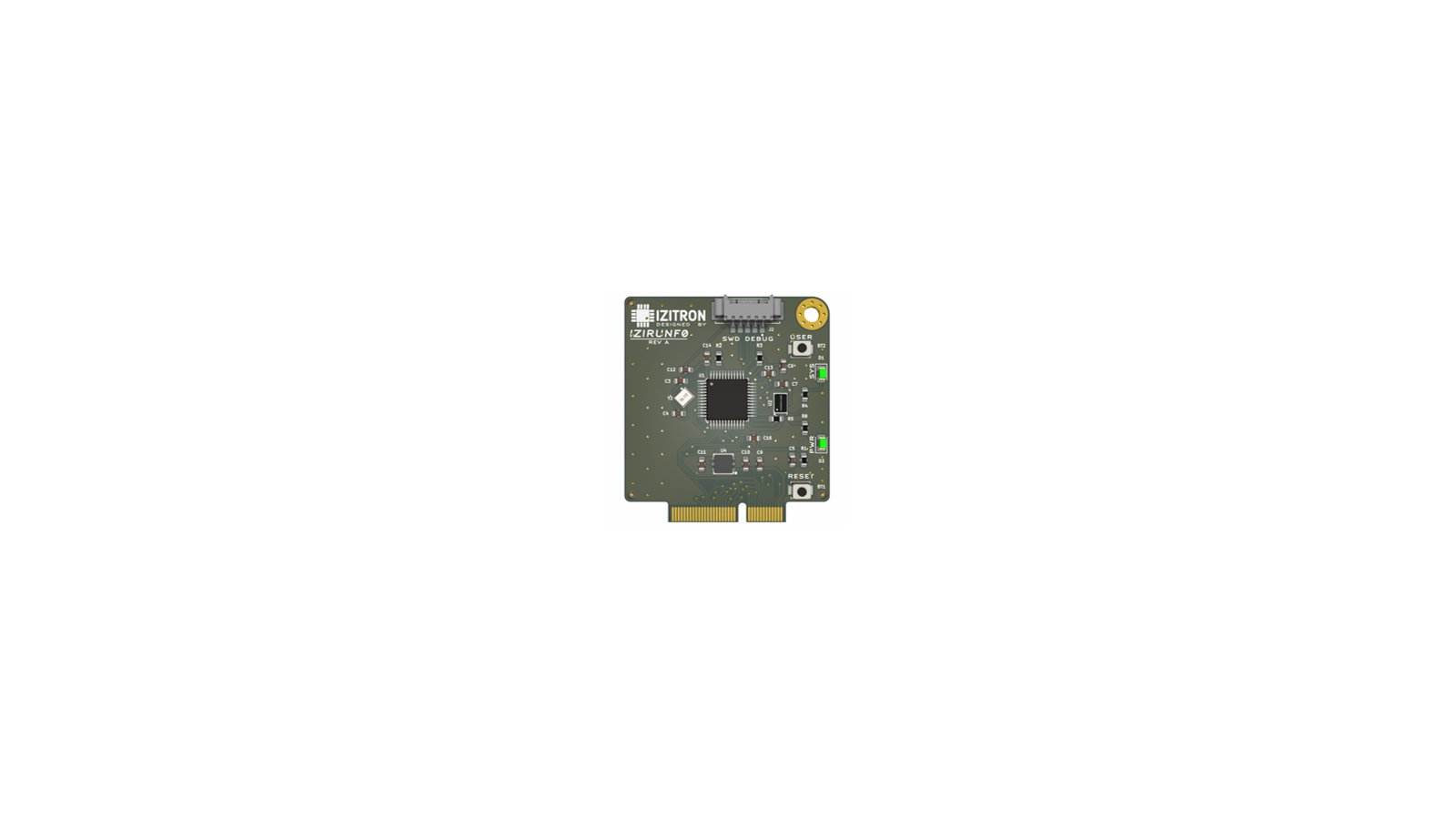
IZIRUNF0 is based on ARM Cortex-M0 (STM32F030CCT6) and is designed for low-power applications and IoT projects. It's a compact board that speeds up development thanks to build-in peripherals like EEPROM flash, SRAM, NOR flash, LEDs, buttons, an external crystal, and a debug connector. IZIRUNF0 has an M.2 connector footprint, with up to 67 pins, that can be used to communicate with external peripherals via I²C, SPI, CAN, and UART.
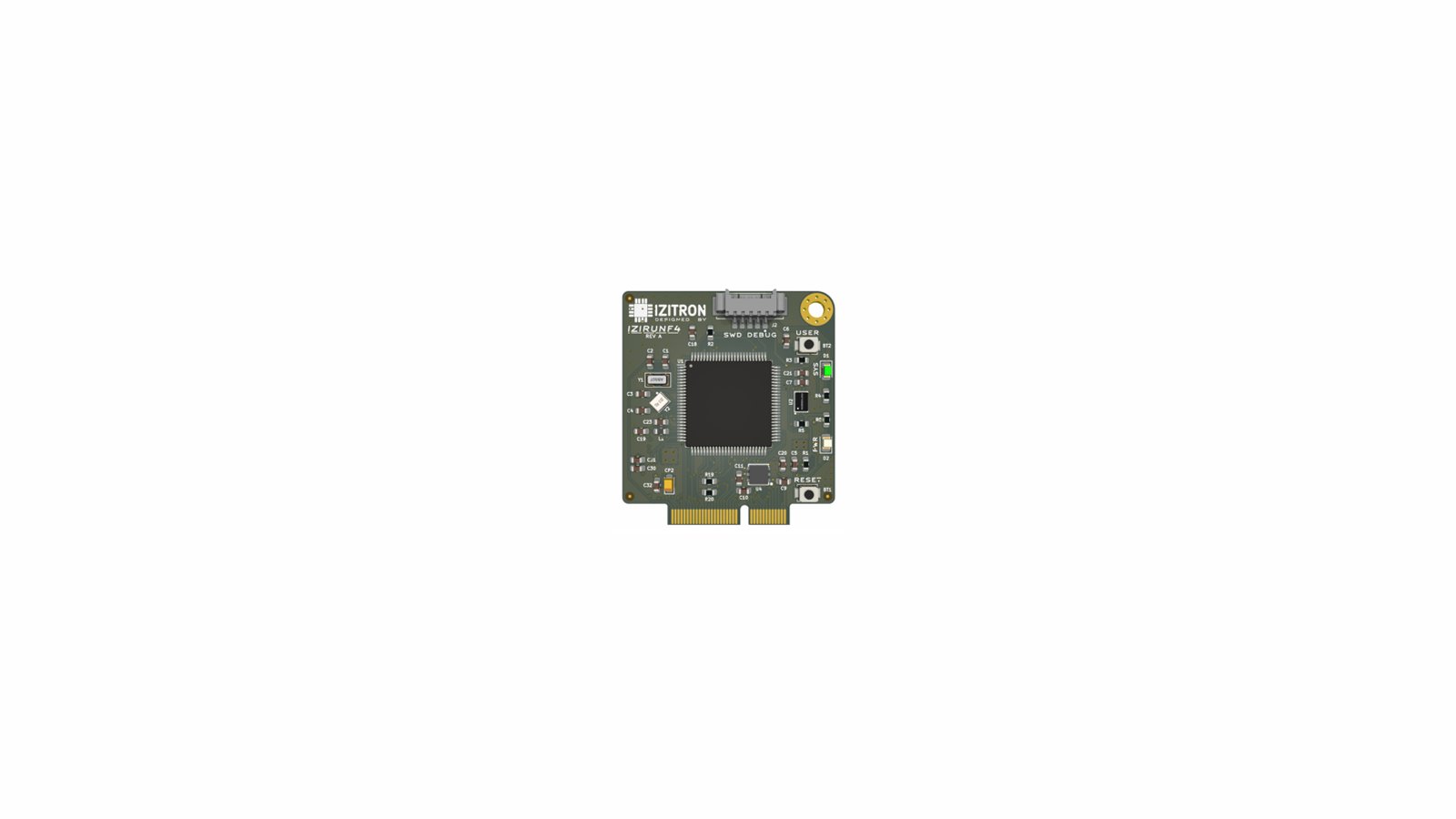
IZIRUNF4 is based on ARM Cortex-M4 (STM32F407VET6) and is designed for mid-range applications like motor control, displays, CAN control, Ethernet connectivity, etc. It's a compact board that speeds up development thanks to build-in peripherals like EEPROM flash, SRAM, NOR flash, LEDs, buttons, an external crystal, and a debug connector. IZIRUNF4 has an M.2 connector footprint, with up to 67 pins, that can be used to communicate with external peripherals via I²C, SPI, CAN, and UART.
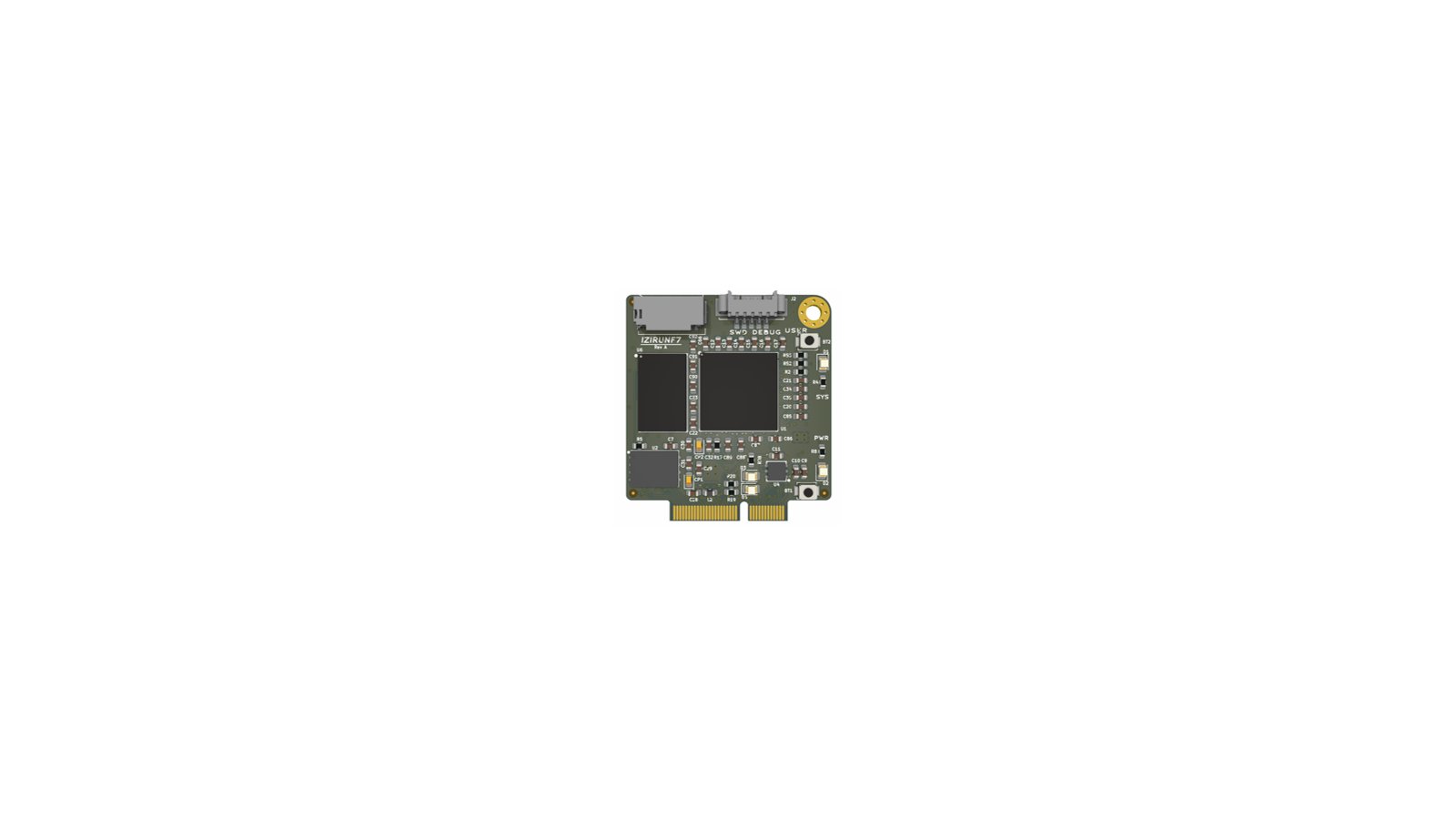
IZIRUNF7 is based on ARM Cortex-M7 (STM32F769NIH6) and is designed for multimedia applications that require resources such as 2D graphics acceleration, sound, Ethernet connectivity, etc. It's a compact board that speeds up development thanks to build-in peripherals like EEPROM flash, SRAM, NOR flash, LEDs, buttons, an external crystal, and a debug connector. IZIRUNF4 has an M.2 connector footprint, with up to 67 pins, that can be used to communicate with external peripherals via I²C, SPI, CAN, and UART.
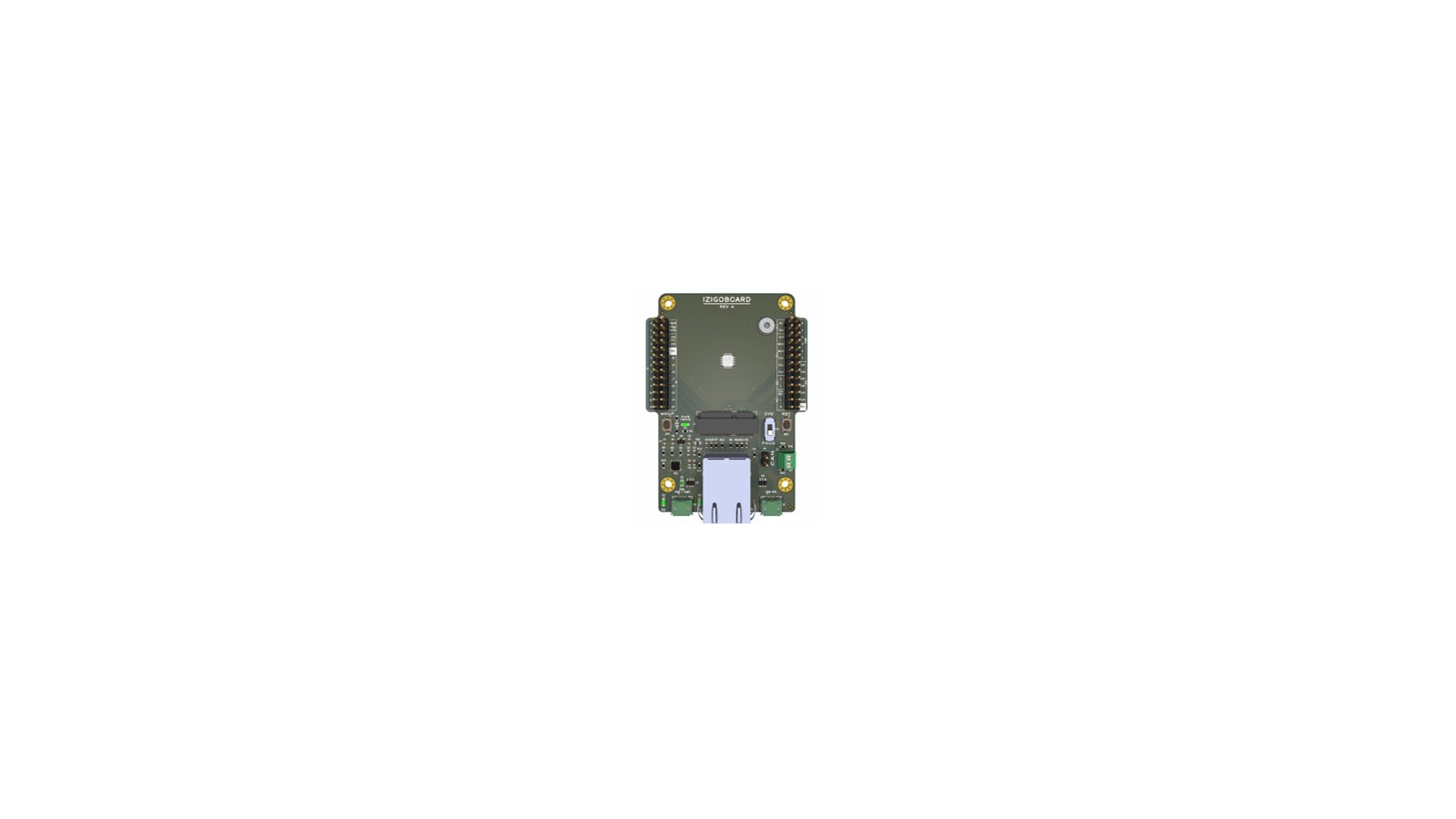
IZIGOBOARD is a baseboard that can be used with the IZIRUNF0, IZIRUNF4, and IZIRUNF7 MCU modules. It includes a microUSB connector for power and communication, thanks to a USB/UART convertor chip. It also provides RJ45 Ethernet and USB OTG connectors.
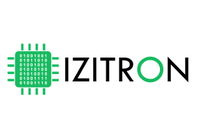
We provide full-stack firmware and hardware development services, covering the entire process of a product development from initial analysis to industrialization.